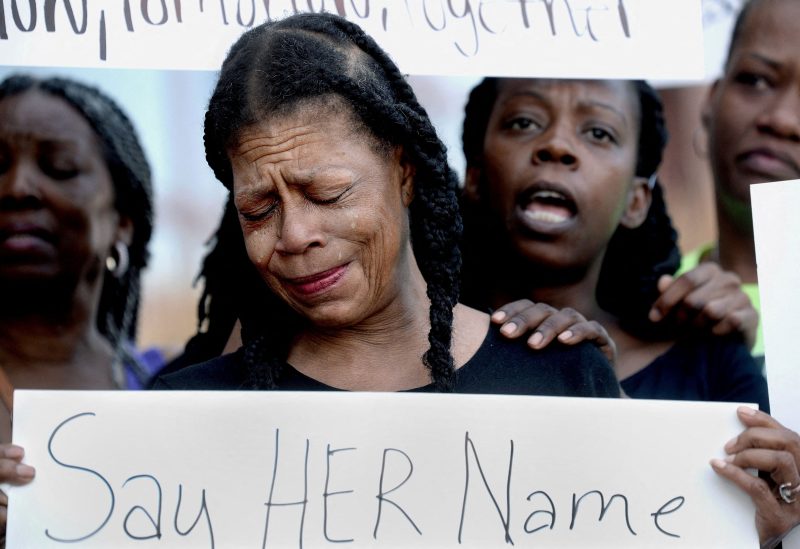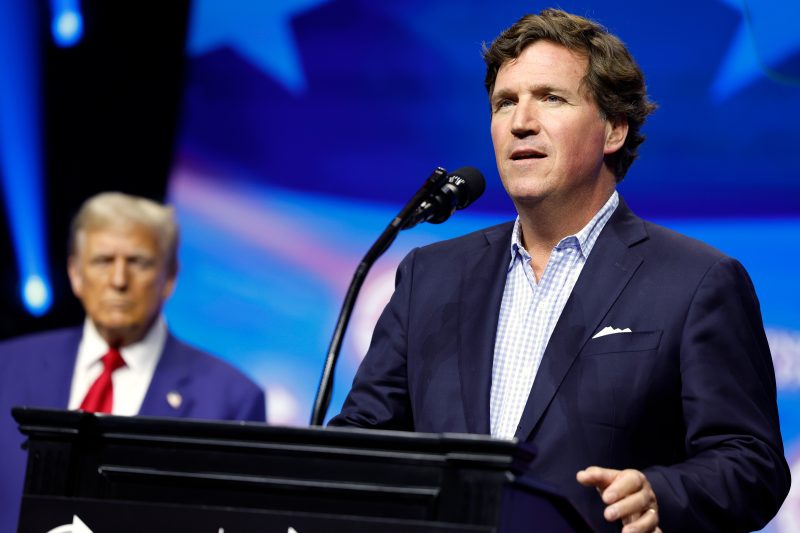
Kamala Harris and Sonya Massey: Two Black women in two American realities
SPRINGFIELD, Ill. — Vice President Harris dominated the news last week as she became the likely Democratic nominee, a first for a woman of color. But that potentially historic milestone barely registered for Jasmine Hudson, who was sitting in grief over another Black woman in the news: her second cousin, Sonya Massey.
On July 22, the same day Harris locked up endorsements for the nomination, Illinois State Police released body-camera video showing the fatal July 6 shooting of Massey, a 36-year-old mother of two, by a sheriff’s deputy who responded to Massey’s 911 call about a potential prowler at her south Springfield home.
Hudson, who is also Black, had struggled to eat or sleep as her family sought answers about why and how Massey was killed. The footage only made the pain worse. The woman she saw in the video was the same person she’d known her entire life — a slight, petite woman who was soft-spoken and spiritual, “someone who wouldn’t hurt anyone,” she said. And now, her cousin was a hashtag, joining other Black women like Breonna Taylor whose lives were cut short in fatal police encounters.
“My family is not doing good at all,” saidHudson, 33,struggling to speak through tears. “We are in shambles. We are in shock. We are distraught. … Why did this happen to her? It doesn’t make any sense.”
To Hudson, it all seemed so far away from the world where Harris’s ascent was being celebrated. One Black woman has the chance to make history as the first female president, while another Black woman, dressed in her pajamas and a headscarf, is regarded as a threat and shot to death in her kitchen.
Harris will formally accept the nomination at the Democratic convention later this month in Chicago, 200 miles northeast of where Massey died in Springfield.
“It’s good to see Black women are making strides, but we are not making enough strides. Because if that was the case, my cousin should have been able to call for help and not been killed by a police officer,” Hudson said.
Massey’s death comes four years after the police killings of Taylor and George Floyd, whose final minutes beneath the unrelenting knees of a Minneapolis police officer were captured in a horrific viral video that spurred worldwide protests and an American reckoning on race and policing that continues to divide the country.
Floyd’s murder spurred promises of change from across the political spectrum. But for many Black Americans, who still live in fear of their interactions with law enforcement, that change hasn’t materialized. Many of the proposed reforms championed by President Biden and Harris haven’t passed — including legislation that would make it easier to punish and fire problem officers and enact limits on racial profiling and the use of deadly force.
Civil rights attorney Ben Crump, who was retained by Floyd’s family and Taylor’s mother, is now representing the Massey family and fought for the public release of the body-cam footage. “It is the worst police-shooting video I have ever seen,” Crump said last week.
On the morning after the footage was made public, Crump was with Massey’s parents when he saw that he had missed a call from Harris, a friend and ally who regularly calls him for updates about his cases. She was trying to connect with Massey’s family, he said.
The night before, Crump had been one of the speakers on a call with thousands of Black men, urging them to rally behind Harris’s bid for the presidency, and now he was with Massey’s family in the darkest moment of their lives.
“I was thinking about my dear friend … ascending to this place where no other Black woman has ever been in the history of the United States,” Crump recalled. “And literally at the same time … I’m thinking about the loss of so much the world could have gotten from Sonya Massey.”
Crump thought of his 11-year-old daughter. Would Harris’s milestone change things for her? Or would she grow up in the reality that Massey and other Black women have faced? “The fact is that no matter how high a Black woman rises in America, there is no guarantee that she will be respected and protected,” Crump said.
In the stories of Harris and Massey, Crump said, “it really is a tale of two historical moments in America. It’s like the best of times and the worst of times.”
Springfield’s ugly history on race
That dichotomy was on the minds of many here in Springfield, the state capital of Illinois and a city of roughly 110,000 known for its connection to two storied American presidents who made history on issues of race: Abraham Lincoln and Barack Obama. They both launched their political careers here, and their names and images are everywhere.
But Springfield also hasan ugly history on race. A violent 1908 race riot left several people dead, hundreds injured and scores of Black-owned businesses burned and destroyed, leadingto the founding of the NAACP. And more than a century later, the scars from that seismic event linger, residents say, in a city that remains deeply segregated and where discussion of Springfield’s fraught racial history was rare until recently, despite its connection to the first Black president.
“People talk about Abraham Lincoln, and they talk about Barack Obama. But many people didn’t know about the race riots because it was a taboo secret that people didn’t talk about,” said Teresa Haley, a Black activist and former president of the local NAACP.
Massey’s killing at the hands of a White police officer has only enforced a feeling that little has changed over the past 115 years, Haley said.
Haley, 59, has barely slept since she saw the video of Massey’s shooting. “Each time I watch it, I think about Black women all over America being hunted,” she said last week, as she stood with members of the Massey family during a news conference at the local NAACP headquarters. “Those of us who have sons and daughters, we used to be concerned about our sons. But now we need to be concerned about Black women, as well.”
She isskeptical Harris’s political rise willchange anything for Black women or protect them from being killed. “It’s our reality. It’s become our new normal. And it should not be that way,” she said.
Others worry that Harris’s candidacy will only intensify the racism and sexism that women of color already experience — especially as she runs against former president Donald Trump, who has a history of insulting women and people of color. Trump questioned Harris’s racial identity on Wednesday, saying that she “was Indian all the way” but then “became a Black person” for political benefit. Harris later condemned “the divisiveness and the disrespect” of Trump’s words.
The incident that led to Massey’s killing unfolded in the early morning hours of July 6 when she called 911 reporting a potential intruder. Two deputies from the Sangamon County Sheriff’s Office responded andsearchedaround Massey’s house. Finding nothing, they knocked on the front door. According to the body-camera footage, it took roughly three minutes for Massey to open the door, and when she did, she immediately seemed nervous, quietly telling the officers, “Don’t hurt me.”
The video shows Deputy Sean Grayson towering over Massey — who, according to her autopsy, stood 5 feet 4 inches and weighed 112 pounds. As he pressed Massey on why she had taken so long to come to the door, she quickly apologized and explained that she had been getting dressed.
According to her family, Massey had been suffering from mental health issues, and she was home alone — her teenage son and daughter were staying with relatives while she sought help. Her mother, Donna, had called 911 a day earlier to report that her daughter was having a mental breakdown and pleaded with an operator: “Please don’t send no combative policemen that are prejudiced — please.”
It is unclear whether Grayson or his partner knew about that call or Massey’s mental troubles. In the video, Massey appears confused, but she remains unfailingly polite, at one point thanking the officers for coming. “I love y’all. Thank y’all,” she says, as she seeks to close the door.
The footage shows the officers ending up inside her home — waiting for Massey to produce identification. At one point, Grayson notices a pot of boiling water sitting over a flame on the stove. “We don’t need a fire while we’re here,” he tells Massey, according to the footage from his partner’s body camera. (Grayson had not activated his camera, a violation of department policy, according to the sheriff’s office.)
The video shows Massey walking to the kitchen to remove the pot from the stove, taking it near the sink. Suddenly, the officers, who are standing in the living room, appear to consider the boiling water a potential threat, and as they back away, Massey twice tells them, “I rebuke you in the name of Jesus.”
The officers appear to regard Massey’s words as a threat — though the statement is a common spiritual phrase that invokesthe power of the Messiah to speak out against something untoward, negative or evil. Massey’s family has said the phrase was common in their predominantly Black church, andtheybelieve she sensed something bad was about to happen.
Grayson drew his gun and pointed it at Massey, shouting expletives and threatening to shoot her. The woman ducked and immediately apologized. The footage shows Grayson step from the living room toward Massey, firing three times.
Massey’s autopsy, made public last week, found she was hit once in the face, near her lower left eyelid. The bullet trajectory was downward, exiting out the back of her neck, according to the coroner — a detail Crump says suggests that Massey was in a stooped position when Grayson shot her.
The video shows Grayson discourage his partner from trying to help Massey, who was still breathing. “That’s a headshot,” Grayson said. “There’s nothing you can do, man.”
Grayson, 30, who had worked for Sangamon County since May 2023, was indicted July 17 on five counts, including three charges of first-degree murder, aggravated battery with a firearm and official misconduct. Grayson has pleaded not guilty and is being held at the Sangamon County Jail without bond. He was fired from the sheriff’s office. Daniel Fultz, an attorney for Grayson, declined to comment.
The morning after the video footage was released, Harris said, “Sonya Massey deserved to be safe.”
“The disturbing footage released yesterday confirms what we know from the lived experiences of so many — we have much work to do to ensure that our justice system fully lives up to its name,” Harris said in a statement. She called on Congress to pass police reforms, including legislation that would enact uniform policing rules across the country and make it easier to punish or charge bad officers.
That bill, known as the George Floyd Justice in Policing Act, was co-authored by Harris in 2020 when she was in the Senate — and still has not passed.
‘A completely different world’
Massey’s death has not drawn the national attention other high-profile police killings have — something that many of those grieving in Springfield have blamed on the intense barrage of news in recent weeks, including Trump’s attempted assassination and Biden’s exit from the presidential race.
And likewise, few Black women here say they’ve had the emotional capacity to process what it would mean to have a Black woman atop the presidential ticket. But many have drawn parallels from this moment to the past.
Tiffani Saunders, a sociologist and organizer with Black Lives Matter Springfield, is reminded of the post-slavery era when some Black people were getting elected to office for the first time, even as other Black people were being lynched. “In some ways,” she said, “this is more of the same historical narrative than like a blip of something different.”
Sunshine Clemons, 45, thinks of Philando Castile, a Black man who was fatally shot in July 2016 by a Minneapolis-area police officer during a traffic stop. Days after his death, Clemons helped found the local Black Lives Matter chapter to help Black residents cope with their grief and fight for change.
Clemons couldn’t stop thinking about how Castile and Massey were killed on the same day, eight years apart. “He launched us, and now we’re fighting for her in our city,” Clemons said, wiping tears away. It added to a sense of futility, that nothing would bring real change — not even a Black woman president.
She said she’s been too “overwhelmed and exhausted and angry and sad” to process the presidential race. “I can’t even see outside our city right now,” Clemons said. “It’s almost like that’s an alternate reality that’s happening. You talk about, this is progress. But that just feels like a completely different world.”
Last week, a couple hundred people marched through downtown Springfield toward the county government building, home to the courthouse, sheriff’s office and jail where Grayson remains in custody.
The crowd of mostly Black people, but also a few Whites, paused before the front steps and chanted, “Justice for Sonya Massey!” Several parents walked with their young children or wheeled them in wagons. One woman carried a sign with Massey’s words: “Don’t hurt me.”
Among those peacefully marching was Doris Turner, 70, an Illinois state senator who made history when she became the first Black woman to represent Springfield in the state legislature. Turner said she was thrilled by the history Harris could make if she becomes the first Blackfemale president.
“It’s for the future generations,” Turner said. “When I talk about my own history, it’s not because I think I am all that great or fabulous. It’s because I want the little Black girls to know they can do it, too. And that’s what Vice President Harris’s election means to me.”
But Turner acknowledged that the history Harris could make stands in stark contrast to what happened to Massey, a close family friend who had just been on Turner’s porch talking to her a week before she was killed.
Turner hasfound herself questioning God about why two such cataclysmic events happened at once. “God is at work in everything that we do. … What are we supposed to be learning from this; what are we supposed to be doing?” she said.
For now, Turner has joined with Massey’s family in seeking justice. But she wondered whether the tragedy could serve as a wake-up call for Black people. “I think that people who have been pretty disinterested about the election and thinking about it in terms of, ‘It’s not going to matter to me one way or another.’ I think that this shows them the difference and shows them that elections matter, and it shows them that representation matters,’ Turner said.
But many weren’t convinced that Harris’s rise would mean a dramatic difference in how Black women are treated by society and by the police.
“Black women are not respected. They are not cared for,” said Hudson, Massey’s cousin. “They are held to different standards.”
Hudson began to cry thinking of her 9-year-old twin daughters andtheir futures. She had never been one to mince words with her girls — warning them from a young age of what it means to be Black in America, including how to interact with law enforcement, how people perceive you because of the color of your skin. It was the only way she knew to keep them safe and alive.
She took them to one of the protests over Massey’s death, explaining what happened to her cousin and why they were there.
“They are so smart,” Hudson said, crying. “They need to know what kind of world we live in.”



